Turkey national football team
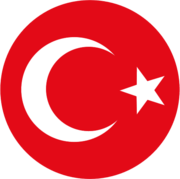 | |||
| Nickname(s) |
Ay-Yıldızlılar (The Crescent-Stars)[1] | ||
|---|---|---|---|
| Association | Türkiye Futbol Federasyonu (TFF) | ||
| Confederation | UEFA (Europe) | ||
| Head coach | Mircea Lucescu | ||
| Captain | Arda Turan | ||
| Most caps | Rüştü Reçber (120) | ||
| Top scorer | Hakan Şükür (51) | ||
| FIFA code | TUR[2] | ||
| |||
| FIFA ranking | |||
| Current |
38 | ||
| Highest | 5 (June 2004) | ||
| Lowest | 67 (October 1993) | ||
| Elo ranking | |||
| Current |
33 | ||
| Highest | 10 (16 October 2002, November 2002) | ||
| Lowest | 72 (13 November 1985, 29 October 1986) | ||
| First international | |||
|
(Istanbul, Turkey; 26 October 1923)[3] | |||
| Biggest win | |||
|
(Ankara, Turkey; 20 November 1949) (Geneva, Switzerland; 20 June 1954) (Istanbul, Turkey; 10 November 1996) | |||
| Biggest defeat | |||
|
(Chorzów, Poland; 24 April 1968) (Istanbul, Turkey; 14 November 1984) (London, England; 14 October 1987) | |||
| World Cup | |||
| Appearances | 2 (first in 1954) | ||
| Best result | Third place, 2002 | ||
| European Championship | |||
| Appearances | 4 (first in 1996) | ||
| Best result | Semi-finals, 2008 | ||
| Confederations Cup | |||
| Appearances | 1 (first in 2003) | ||
| Best result | Third place, 2003 | ||
The Turkey national football team (Turkish: Türkiye Millî Futbol Takımı) represents Turkey in association football and is controlled by the Turkish Football Federation, the governing body for football in Turkey. They are affiliated with UEFA.
Turkey has qualified three times for the FIFA World Cup, in 1950, 1954, and 2002, although they withdrew from the 1950 event. Turkey has also qualified four times for the UEFA European Championship, in 1996, 2000, 2008, and 2016. They have reached the semi-finals of three major tournaments: the 2002 World Cup, the 2003 FIFA Confederations Cup, and Euro 2008. After their third-place finish at the 2002 World Cup, which marked a high point in Turkish football history, Turkey occupied a spot in the top ten of the FIFA World Rankings for the first time since the rankings were introduced in December 1992.[4]
History
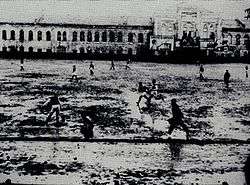
Early years
The Turkey national team played their first ever match against Romania in 1923, drawing 2–2.[5] Zeki Rıza Sporel is considered as the first big star of Turkish football as he scored the first two goals against Romania. Turkey played their first ever official match at the 1924 Summer Olympics losing 5–2 to Czechoslovakia.
1950 FIFA World Cup
Although Turkey qualified for the 1950 World Cup, beating Syria 7–0, they were forced to withdraw from the tournament due to financial problems.
1954 FIFA World Cup
Turkey then qualified for the 1954 World Cup after a play-off with Spain. The Turkish team first lost 4–1 to Spain, but a 1–0 win a few days later initiated a replay. On that occasion, they tied 2–2 after, booking their place after a coin toss. Turkey was put in a group along with Hungary and West Germany. The Turks, however, never played Hungary due to the tournament format, and a 4–1 defeat by the Germans was followed by Turkey carrying out a 7–0 win over South Korea. Turkey lost the play-off to West Germany 7–2. In 1956, however, Turkey did play Hungary in a friendly match in Istanbul, defeating what was one of the strongest teams of the era, 3–1.[6] Lefter Küçükandonyadis, arguably one of the best Turkish players of all-time, scored two goals during the tournament.
Near misses
Despite the introduction of a national league, and showings by Turkish clubs in European competition, the 1960s would be a barren time for the national team. Most players from the 1954 World Cup squad were retired, and the new generation of players failed to qualify for a major tournament. The 1970s saw Turkey holding back in the World Cup and UEFA European Championship qualifiers, but the team was a point too short to qualify for both UEFA Euro 1972 and Euro 1976. In the 1980s the Turkish team also suffered their worst defeats with 8–0 scorelines against Poland and twice against England. Yet the 1990 World Cup qualifiers would mark a turning point for Turkish football, with Turkey only missing out on qualification in the final match. Prominent players in this period included Rıdvan Dilmen, Oğuz Çetin, Rıza Çalımbay, Feyyaz Uçar, and European Golden Boot winner Tanju Çolak.
1990–1996
In 1990, German coach Sepp Piontek was put in charge of the national team. Under his guidance, a group of new players debuted for the national team. Many of these players (which included Bülent Korkmaz, Alpay Özalan, Sergen Yalçın, Rüştü Reçber, and Hakan Şükür) would become the backbone of the national team for many years. Piontek's mission came to an end in 1993, where he was replaced by Fatih Terim, who in turn managed to qualify for Euro 1996. Turkey qualified for its first major tournament since 1954, marking another turning point for Turkish football after having failed to qualify for both Euro 1992 and the 1994 World Cup. The appointment of Piontek was a recommended move by another German coach, Jupp Derwall, who had coached Galatasaray for three seasons. Derwall is regarded as the revolutionizer of Turkish football, since his introduction of modern Western European training techniques and tactical ideas to the Turkish game also heavily influenced the national team.
Euro 1996
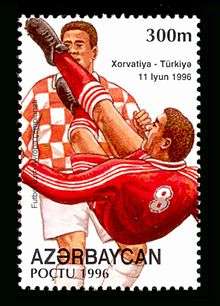
Turkey qualified for Euro 1996, defeating both Switzerland and Sweden 2–1 en route during qualification. Despite a solid performance during the qualifiers, Turkey lost all their matches without scoring a single goal. They did, however, go home with an award: the fair-play award, given to Alpay Özalan.
Euro 2000
Although Turkey failed to qualify for the 1998 World Cup, they qualified for Euro 2000 after winning a play-off against the Republic of Ireland. Turkey lost their first match 2–1 to Italy, they drew their second match against Sweden 0–0, and beat host nation Belgium 2–0, making it the first time in the history of the UEFA European Championship a host nation had been eliminated in the first round. This victory brought Turkey into the last eight of the tournament, where they were beaten 2–0 by Portugal, with Arif Erdem missing a critical penalty.
2002 FIFA World Cup
For the 2002 World Cup, Turkey finished second in their qualifying group, despite starting well and being the favourites to top the group. They lost 2–1 to Sweden in the crucial match that would decide the top spot. The Turks were forced to play the play-offs against Austria. They defeated the Austrians 6–0 on aggregate and booked their place at the finals. The Turkish team started the 2002 World Cup with a 2–1 defeat against eventual winners Brazil.[7] Turkey qualified from the group stage with a 3–0 win against China PR after drawing 1–1 with Costa Rica.[8][9]
Turkey then faced home team Japan in the second round, winning 1–0.[10] The Turkish team continued their run, as they beat Senegal 1–0 on a golden goal to book their place in the semi-finals, where a 1–0 defeat against eventual tournament winners Brazil forced them to play the third place match, and a bronze medal was won after a 3–2 victory over co-hosts South Korea.[11][12][13] Hakan Şükür scored Turkey's first goal in 10.8 seconds, even when the South Koreans kicked off first. It was the fastest goal in World Cup history.[14] Tens of thousands of flag-waving Turkish fans greeted the World Cup squad on their return to Istanbul, where they joined a massive street party at Taksim Square.[15] Rüştü Reçber, Alpay Özalan and Hasan Şaş were all included in the All-Star Team, with Reçber also being voted as the best goalkeeper in the UEFA Team of the Year 2002, while Şenol Güneş was being voted as the best manager.
2003 FIFA Confederations Cup
In the summer of 2003, Turkey reached third place at the 2003 FIFA Confederations Cup. In the group stages, Turkey defeated the United States 2–1 before losing to Cameroon 0–1. In their final group match, Turkey drew 2–2 against Brazil, eliminating them from the tournament. Turkey lost to eventual tournament winners France 3–2 in the semi-final match. Turkey then defeated Colombia 2–1 to win the bronze medal. Tuncay Şanlı scored three goals and made an assist, which won him the Silver Shoe Award and the Silver Ball Award for the second best player of the tournament.
Euro 2004
The Turkish team failed to qualify for Euro 2004 on play-offs due to a loss to Latvia after finishing second in their group. This marked a turning point for the national team as new players were introduced to the national team to create a new generation.
2006 FIFA World Cup
The Turkish team once again narrowly missed out on the World Cup finals after failing to win a play-off, this time on away goals against Switzerland, again after finishing second in their group. There were scenes of violence after the game on and off the pitch where the Turkish team brawled with Swiss players down the tunnel.
.jpg)
Euro 2008
Turkey qualified for their first international tournament in six years by finishing second behind Greece in Euro 2008 qualifying Group C to reach the Euro 2008 final stages. They were placed alongside Switzerland, Portugal and the Czech Republic in Group A. In their first match, they played Portugal and were beaten 2–0, but wins over Switzerland (2–1) and the Czech Republic (3–2) – both secured by late goals – brought qualification for the knockout stages.[16][17][18] Again, Turkey knocked out a host nation – Switzerland – in the group stages for the second time.[19]
The quarter-final against Croatia was goalless after 90 minutes, and Croatia led 1–0 in the final minute of extra time, but another late Turkish goal by forward Semih Şentürk brought the game to penalties. The goal raised some controversy with Croatia fans and Croatia head coach Slaven Bilić, who claimed that the goal had been scored after extra time had elapsed. This complaint, however, was overruled, and the game went into penalties. Turkey defeated Croatia in penalties, 3–1.[20]
Turkey went into the semi-final against Germany with just 14 outfield players available as a result of injuries and suspensions, but scored first and were drawing 2–2. But they finished third by default after losing 3–2 with a last minute goal by Philipp Lahm.[21] Both Russia and Turkey were given bronze medals in the dressing rooms after the semi-finals.
2010 FIFA World Cup
.jpg)
For the 2010 World Cup qualifiers, Turkey had a mixed qualifying campaign, finishing with 15 points and missing out on a play-off place to Bosnia and Herzegovina with 19 points. Spain topped the group to qualify, winning every game in the process. Coach Fatih Terim announced he would be resigning his post following their failure to qualify.[22]
Euro 2012
Turkey were drawn in Group A in qualification for Euro 2012, together with Kazakhstan, Austria, Belgium, Germany and Azerbaijan. The Turkish team reached the play-offs after beating Azerbaijan 1–0 but got eliminated 3–0 on aggregate by Croatia. On 14 November 2012, Turkey celebrated their 500th match in a friendly game played against Denmark at the Türk Telekom Arena, Istanbul, which ended in a 1–1 draw. Before the match, footballers and coaches, who contributed to the national team's success in the past, were honoured. Turkish pop singer Hadise, who wore a national team jersey with the number 500, performed a small concert.[23][24]
2014 FIFA World Cup
.jpg)
Turkey were drawn in Group D in qualification for the 2014 World Cup, together with Andorra, Estonia, Hungary, the Netherlands and Romania, finishing fourth. Turkey began to lose critical points during qualification and Abdullah Avcı was sacked soon after. Fatih Terim was put in charge for the third time to lead the national team, but a 2–0 defeat against the Netherlands ended hopes of qualification.
Euro 2016
Turkey were drawn in Group A in the qualification campaign for the Euro 2016, together with Iceland, Latvia, Kazakhstan, the Netherlands and the Czech Republic. The Turkish team qualified for their first major tournament in eight years as the best third-placed team after beating Iceland 1–0, with Selçuk İnan netting a free kick in the 89th minute. After over 18 months unbeaten, a loss to England as a pre-tournament friendly ended the team's winning streak, subsequently leading to back-to-back losses against Croatia and Spain in the tournament. Turkey won their last game against the Czech Republic, 2–0. They were minutes away from reaching the last 16, until a late winner for Ireland against Italy meant that the latter instead qualified as one of the best third-placed teams. Despite elimination, youngster Emre Mor's skillful display and assist during the game revealed a hopeful future for Turkish football.
2018 FIFA World Cup
Turkey were drawn in UEFA Group I for the 2018 World Cup qualifying campaign. During the qualifiers, head coach Fatih Terim stood down after an off-field incident,[25] and 72-year-old former Romania manager Mircea Lucescu took over. After eight games, Turkey stood a strong chance of qualifying for the tournament, but a 0–3 defeat against Iceland at home ended automatic qualification hopes. After a 2–2 draw against Finland the team finished fourth in Group I.
Fixtures and results
2017
| 2 September 2018 FIFA WC Q | Ukraine | 2–0 | Kharkiv, Ukraine | |
| 20:45 (21:45 (UTC+3) |
Yarmolenko |
Report (FIFA) Report (UEFA) |
Stadium: Metalist Stadium Attendance: 36,796 Referee: David Fernández Borbalán (Spain) |
| 5 September 2018 FIFA WC Q | Turkey | 1–0 | Eskişehir, Turkey | |
| 20:45 (21:45 (UTC+3) |
Tosun |
Report (FIFA) Report (UEFA) |
Stadium: New Eskişehir Stadium Attendance: 28,600 Referee: Viktor Kassai (Hungary) |
| 6 October 2018 FIFA WC Q | Turkey | 0–3 | Eskişehir, Turkey | |
| 20:45 (21:45 (UTC+3) |
Report (FIFA) Report (UEFA) |
Guðmundsson Bjarnason Árnason |
Stadium: New Eskişehir Stadium Referee: Szymon Marciniak (Poland) |
| 9 October 2018 FIFA WC Q | Finland | 2–2 | Turku, Finland | |
| 20:45 (21:45 (UTC+3) |
Arajuuri Pohjanpalo |
Report (FIFA) Report (UEFA) |
Tosun |
Stadium: Veritas Stadion Referee: Benoît Bastien (France) |
| 9 November Friendly | Romania | 2–0 | Cluj-Napoca, Romania | |
| 21:15 (UTC+3) | Grozav |
Report | Stadium: Stadionul Dr. Constantin Rădulescu Attendance: 20,000 Referee: Tiago Martins (Portugal) |
2018
| 23 March Friendly | Turkey | 1–0 | Antalya, Turkey | |
| 18:30 (UTC+2) | Topal |
Report | Stadium: Antalya Arena Attendance: 32,000 Referee: Slavko Vinčić (Slovenia) |
| 27 March Friendly | Montenegro | 2–2 | Podgorica, Montenegro | |
| 19:10 (UTC+2) | Ivanić Mugoša |
Report | Ünder Yokuşlu |
Stadium: Podgorica City Stadium Attendance: 6,000 Referee: Milorad Mažić (Serbia) |
| 28 May Friendly | Turkey | 2–1 | Istanbul, Turkey | |
| 21:15 (UTC+3) | Tosun |
Report | Dejagah |
Stadium: Başakşehir Fatih Terim Stadium Referee: Valentin Kovalenko (Uzbekistan) |
| 1 June Friendly | Tunisia | 2–2 | Geneva, Switzerland | |
| 20:15 (UTC+2) | Badri Sassi |
Report | Tosun Söyüncü |
Stadium: Stade de Genève Attendance: 12,000 Referee: Fedayi San (Switzerland) |
| 5 June Friendly | Russia | 1–1 | Moscow, Russia | |
| 19:00 (UTC+3) | Samedov |
Report | Mallı |
Stadium: VEB Arena Attendance: 30,000 Referee: Ovidiu Hațegan (Romania) |
| 7 September 2018–19 UEFA Nations League | Turkey | 1–2 | Trabzon, Turkey | |
| 20:45 (21:45 UTC+3) |
Aziz |
Report | Cheryshev Dzyuba |
Stadium: Şenol Güneş Stadium Attendance: 29,702 Referee: Artur Soares Dias (Portugal) |
| 10 September 2018–19 UEFA Nations League | Sweden | 2–3 | Solna, Sweden | |
| 20:45 (20:45 UTC+2) |
Kiese Thelin Claesson |
Report | Çalhanoğlu Akbaba |
Stadium: Friends Arena Attendance: 21,832 Referee: Jesús Gil Manzano (Spain) |
| 11 October Friendly | Turkey | 0–0 | Rize, Turkey | |
| 20:30 (UTC+3) | Report | Stadium: Yeni Rize Şehir Stadium Referee: Sergei Karasev (Russia) |
| 14 October 2018–19 UEFA Nations League | Russia | 2–0 | Sochi, Russia | |
| 18:00 (19:00 UTC+3) |
Neustädter Cheryshev |
Report | Stadium: Fisht Olympic Stadium Referee: Paweł Raczkowski (Poland) |
| 17 November 2018–19 UEFA Nations League | Turkey | v | Eskişehir, Turkey | |
| 18:00 (20:00 UTC+3) |
Stadium: New Eskişehir Stadium |
Personnel

Current technical staff
| Position | Name |
|---|---|
| Head coach | |
| Assistant coach(es) | |
| Fitness coach | |
| Goalkeeping coach | |
| Nurese |
Players
Current squad
The following players have been called up for the 2018–19 UEFA Nations League matches against Bosnia-Herzegovina and Russia in October 2018.
Caps and goals updated as of 11 October 2018 after the match against Bosnia-Herzegovina.
Recent call-ups
The following players have been called up for the team within the last 12 months.
| Pos. | Player | Date of birth (age) | Caps | Goals | Club | Latest call-up |
|---|---|---|---|---|---|---|
| GK | Harun Tekin | 17 June 1989 | 2 | 0 | v. | |
| GK | Okan Kocuk WD | 27 July 1995 | 0 | 0 | v. | |
| GK | Volkan Babacan INJ | 11 August 1988 | 35 | 0 | v. | |
| DF | Uğur Demirok | 8 July 1988 | 3 | 0 | v. | |
| DF | Ömer Toprak PRE | 21 July 1989 | 27 | 2 | v. | |
| DF | Ozan Tufan | 23 March 1995 | 39 | 4 | v. | |
| DF | İsmail Köybaşı | 10 July 1989 | 28 | 0 | v. | |
| DF | Atila Turan | 10 April 1992 | 2 | 0 | v. | |
| DF | Barış Yardımcı | 14 August 1992 | 2 | 0 | v. | |
| DF | Erol Alkan | 16 February 1994 | 0 | 0 | v. | |
| MF | Emre Akbaba INJ | 4 October 1992 | 6 | 3 | v. | |
| MF | Abdülkadir Ömür | 25 June 1999 | 0 | 0 | v. | |
| MF | İrfan Kahveci | 15 June 1995 | 4 | 0 | v. | |
| MF | Kenan Karaman | 5 March 1994 | 3 | 0 | v. | |
| MF | Mehmet Topal | 3 March 1986 | 79 | 2 | v. | |
| MF | Deniz Türüç | 29 January 1993 | 2 | 0 | v. | |
| MF | Alper Potuk | 8 April 1991 | 17 | 1 | v. | |
| MF | Selçuk İnan | 10 February 1985 | 61 | 8 | v. | |
| FW | Umut Bulut | 15 March 1983 | 39 | 10 | v. | |
| FW | Emre Mor PRE | 24 July 1997 | 15 | 1 | v. | |
- Notes
- PRE = Preliminary squad.
- RET = Retired from international football.
- WD = Withdrew from the squad.
- INJ = Withdrew due to an injury.
Previous squads
Rivalries

Turkey has developed several notable rivalries, the most well-known being with Croatia,[26] Greece and Armenia.
Turkey and Croatia have played each other 9 times,[27] with their first encounter at Euro 1996; where both countries made their debuts in the opening match, which Croatia won 1–0.[28] A well-remembered match between them was at Euro 2008, which Turkey won on penalties after a 1–1 deadlock even after extra-time. With the win, Turkey reached the semi-finals in only their third appearance overall at the Euro finals.[29] The two teams faced each other in the 2012 Euro qualifying play-offs, with Croatia winning 3–0 in the first-leg in Istanbul, and advancing to the tournament finals following a 0–0 draw in the second-leg.[30][31] The two teams faced each other once again in a European competition at Euro 2016, playing in the opening match of Group D; with Croatia winning 1–0 through a sensational Luka Modrić volley.[32][33] Only three months after the match at the Euros, the two teams played in their opening match in Group I of 2018 FIFA World Cup qualifying, which finished 1–1.[34] Exactly one year after this, Turkey won the reverse fixture 1–0 at home, which played a key part in both countries' qualifying campaign.[35][36]
Turkey also has a historical rivalry with Greece; having played them a total of 13 times, winning seven, drawing three and losing three games.[37] Both countries have been described as "punching above their weight"; with Greece winning Euro 2004 despite being classified as underdogs prior to the competition, and Turkey advancing to the semi-finals of Euro 2008, where they were knocked out by Germany. Due to tension between the two countries and the dispute over Cyprus, coupled with several incidents occurring during matches between Turkish and Greek clubs, it has been described as one of the biggest international football rivalries.[38]
Turkey also have a strong rivalry with Armenia, notably when the two teams faced each other in the 2010 World Cup qualifying; several problems and political issues arose prior to the match build-up, particularly as Ankara and Yerevan had not established diplomatic relations since Armenia's independence from the Soviet Union in 1991, as well as due to the fact that the border between the two countries has been "firmly shut" for more than a decade-and-a-half, as well as historical issues, particularly considering the Armenian genocide of the late 1910s. Prior to the match, Abdullah Gül, the President of Turkey, was invited by Armenian President Serzh Sargsyan to the match. Gül accepted the invitation, and 5,000 Turkish supporters were allowed to travel to the stadium to watch the game, although the build-up to the match was tense. Several protesters lined the route of Gül's motorcade, but the match ended peacefully, with Turkey winning 2–0. Foreign ministers from the two countries signed an agreement; opening up a path towards full diplomatic relations.[39]
Competitive record
FIFA World Cup
| FIFA World Cup record | FIFA World Cup qualification record | ||||||||||||||
|---|---|---|---|---|---|---|---|---|---|---|---|---|---|---|---|
| Year | Round | Position | Pld | W | D* | L | GF | GA | Pld | W | D | L | GF | GA | |
| Did not enter | – | – | – | – | – | – | |||||||||
| Withdrew | – | – | – | – | – | – | |||||||||
| Did not enter | – | – | – | – | – | – | |||||||||
| Qualified but withdrew | 1 | 1 | 0 | 0 | 7 | 0 | |||||||||
| Group stage | 9th | 3 | 1 | 0 | 2 | 10 | 11 | 3 | 1 | 1 | 1 | 4 | 6 | ||
| Withdrew | – | – | – | – | – | – | |||||||||
| Did not qualify | 4 | 2 | 0 | 2 | 4 | 4 | |||||||||
| 6 | 1 | 0 | 5 | 4 | 19 | ||||||||||
| 4 | 0 | 0 | 4 | 2 | 13 | ||||||||||
| 6 | 2 | 2 | 2 | 5 | 3 | ||||||||||
| 6 | 2 | 1 | 3 | 9 | 5 | ||||||||||
| 8 | 0 | 0 | 8 | 1 | 22 | ||||||||||
| 8 | 0 | 1 | 7 | 2 | 24 | ||||||||||
| 8 | 3 | 1 | 4 | 12 | 10 | ||||||||||
| 10 | 3 | 1 | 6 | 11 | 19 | ||||||||||
| 8 | 4 | 2 | 2 | 21 | 9 | ||||||||||
| Third Place | 3rd | 7 | 4 | 1 | 2 | 10 | 6 | 12 | 8 | 3 | 1 | 24 | 8 | ||
| Did not qualify | 14 | 7 | 5 | 2 | 27 | 13 | |||||||||
| 10 | 4 | 3 | 3 | 13 | 10 | ||||||||||
| 10 | 5 | 1 | 4 | 16 | 9 | ||||||||||
| 10 | 4 | 3 | 3 | 14 | 13 | ||||||||||
| To be determined | |||||||||||||||
| Total | Third Place | 2/23 | 10 | 5 | 1 | 4 | 20 | 17 | 128 | 47 | 24 | 57 | 176 | 187 | |
UEFA European Championship
| UEFA European Championship record | UEFA European Championship qualifying record | ||||||||||||||
|---|---|---|---|---|---|---|---|---|---|---|---|---|---|---|---|
| Year | Round | Position | Pld | W | D* | L | GF | GA | Pld | W | D | L | GF | GA | |
| Did not qualify | 2 | 1 | 0 | 1 | 2 | 3 | |||||||||
| 2 | 0 | 0 | 2 | 0 | 7 | ||||||||||
| 6 | 1 | 2 | 3 | 3 | 8 | ||||||||||
| 6 | 2 | 1 | 3 | 5 | 13 | ||||||||||
| 6 | 2 | 2 | 2 | 5 | 10 | ||||||||||
| 6 | 3 | 1 | 2 | 5 | 5 | ||||||||||
| 8 | 3 | 1 | 4 | 8 | 16 | ||||||||||
| 6 | 0 | 2 | 4 | 2 | 16 | ||||||||||
| 6 | 0 | 0 | 6 | 1 | 14 | ||||||||||
| Group stage | 16th | 3 | 0 | 0 | 3 | 0 | 5 | 8 | 4 | 3 | 1 | 16 | 8 | ||
| Quarter-finals | 6th | 4 | 1 | 1 | 2 | 3 | 4 | 10 | 5 | 4 | 1 | 16 | 7 | ||
| Did not qualify | 10 | 6 | 2 | 2 | 19 | 8 | |||||||||
| Semi-finals | 3rd | 5 | 2 | 1* | 2 | 8 | 9 | 12 | 7 | 3 | 2 | 25 | 11 | ||
| Did not qualify | 12 | 5 | 3 | 4 | 13 | 14 | |||||||||
| Group stage | 17th | 3 | 1 | 0 | 2 | 2 | 4 | 10 | 5 | 3 | 2 | 14 | 9 | ||
| To be determined | To be determined | ||||||||||||||
| Total | Third Place | 4/16 | 15 | 4 | 2* | 9 | 13 | 22 | 110 | 44 | 27 | 39 | 134 | 149 | |
- *Draws include knockout matches decided by penalty shoot-out.
| List of UEFA European Football Championship matches | |||||
|---|---|---|---|---|---|
| Year | Round | Score | Result | Date | Venue |
| 1996 | Group D | Loss | 11 June 1996 | Nottingham, England | |
| Loss | 14 June 1996 | Nottingham, England | |||
| Loss | 19 June 1996 | Sheffield, England | |||
| 2000 | Group B | Loss | 11 June 2000 | Arnhem, Netherlands | |
| Draw | 15 June 2000 | Eindhoven, Netherlands | |||
| Win | 19 June 2000 | Brussels, Belgium | |||
| Quarter-final | Loss | 24 June 2000 | Amsterdam, Netherlands | ||
| 2008 | Group A | Loss | 7 June 2008 | Geneva, Switzerland | |
| Win | 11 June 2008 | Basel, Switzerland | |||
| Win | 15 June 2008 | Geneva, Switzerland | |||
| Quarter-final | Draw | 20 June 2008 | Wien, Austria | ||
| Semi-final | Loss | 25 June 2008 | Basel, Switzerland | ||
| 2016 | Group D | Loss | 12 June 2016 | Paris, France | |
| Loss | 17 June 2016 | Nice, France | |||
| Win | 21 June 2016 | Lens, France | |||
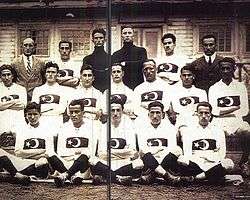
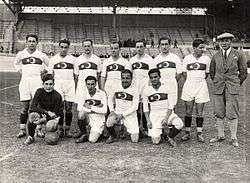
Summer Olympics
| Olympic Games record | ||||||||
|---|---|---|---|---|---|---|---|---|
| Year | Result | Position | GP | W | D* | L | GS | GA |
| Round 1 | 13th | 1 | 0 | 0 | 1 | 2 | 5 | |
| Round 1 | 14th | 1 | 0 | 0 | 1 | 1 | 7 | |
| Round 1 | 15th | 1 | 0 | 0 | 1 | 0 | 1 | |
| Quarter-finals | 6th | 2 | 1 | 0 | 1 | 5 | 3 | |
| Quarter-finals | 8th | 2 | 1 | 0 | 1 | 3 | 8 | |
| Withdrew | ||||||||
| Round 1 | 14th | 3 | 0 | 1 | 2 | 3 | 10 | |
| Did not qualify | ||||||||
| Withdrew | ||||||||
| Did not qualify | ||||||||
| Total | Quarter-finals | 6/23 | 10 | 2 | 1 | 7 | 14 | 34 |
FIFA Confederations Cup
| FIFA Confederations Cup record | |||||||||
|---|---|---|---|---|---|---|---|---|---|
| Year | Round | Position | GP | W | D* | L | GS | GA | Squad |
| Did not qualify | |||||||||
| Third Place | 3rd | 5 | 2 | 1 | 2 | 8 | 8 | Squad | |
| Did not qualify | |||||||||
| Total | Third Place | 1/10 | 5 | 2 | 1 | 2 | 8 | 8 | - |
Mediterranean Games record
| Football at the Mediterranean Games | |||||||||
|---|---|---|---|---|---|---|---|---|---|
| Year | Rank | GP | W | D | L | GS | GA | ||
| - | 0 | 0 | 0 | 0 | 0 | 0 | |||
| - | 0 | 0 | 0 | 0 | 0 | 0 | |||
| 2 | 2 | 1 | 1 | 0 | 7 | 4 | |||
| 2 | 5 | 3 | 1 | 1 | 12 | 7 | |||
| 4 | 5 | 2 | 1 | 2 | 5 | 7 | |||
| 3 | 4 | 3 | 1 | 0 | 4 | 1 | |||
| 7 | 4 | 0 | 2 | 2 | 1 | 5 | |||
| 5 | 3 | 1 | 1 | 1 | 2 | 2 | |||
| 2 | 4 | 2 | 0 | 2 | 4 | 5 | |||
| 3 | 5 | 3 | 0 | 2 | 6 | 2 | |||
| 1991 – present | See Turkey national under-20 team | ||||||||
| Total | 8/10 | 32 | 15 | 7 | 10 | 41 | 33 | ||
Honours
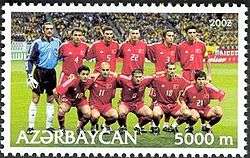
![]()
![]()
![]()
Total results by opponent
The following table shows Turkey's all-time international record, correct as of 5 September 2018.
| Against | Played | Won | Drawn | Lost | GF | GA |
|---|---|---|---|---|---|---|
| 10 | 4 | 2 | 4 | 10 | 14 | |
| 3 | 1 | 0 | 2 | 4 | 2 | |
| 2 | 2 | 0 | 0 | 7 | 0 | |
| 1 | 1 | 0 | 0 | 3 | 2 | |
| 2 | 2 | 0 | 0 | 4 | 0 | |
| 2 | 2 | 0 | 0 | 4 | 1 | |
| 16 | 7 | 1 | 8 | 22 | 18 | |
| 7 | 5 | 1 | 1 | 9 | 2 | |
| 4 | 2 | 1 | 1 | 8 | 7 | |
| 11 | 3 | 5 | 3 | 17 | 18 | |
| 5 | 2 | 1 | 2 | 6 | 7 | |
| 6 | 0 | 2 | 4 | 3 | 10 | |
| 23 | 7 | 6 | 10 | 36 | 43 | |
| 1 | 0 | 0 | 1 | 0 | 1 | |
| 2 | 2 | 0 | 0 | 6 | 1 | |
| 3 | 2 | 1 | 0 | 3 | 0 | |
| 2 | 2 | 0 | 0 | 7 | 0 | |
| 1 | 1 | 0 | 0 | 2 | 1 | |
| 1 | 0 | 1 | 0 | 1 | 1 | |
| 9 | 1 | 5 | 3 | 6 | 10 | |
| 20 | 5 | 3 | 12 | 18 | 44 | |
| 10 | 2 | 5 | 3 | 9 | 12 | |
| 5 | 3 | 1 | 1 | 10 | 5 | |
| 1 | 0 | 0 | 1 | 0 | 1 | |
| 5 | 3 | 0 | 2 | 9 | 10 | |
| 11 | 0 | 2 | 9 | 1 | 33 | |
| 8 | 5 | 3 | 0 | 17 | 4 | |
| 2 | 1 | 1 | 0 | 3 | 0 | |
| 1 | 0 | 1 | 0 | 1 | 1 | |
| 15 | 5 | 4 | 6 | 24 | 22 | |
| 6 | 0 | 1 | 5 | 3 | 15 | |
| 5 | 3 | 1 | 1 | 12 | 5 | |
| 20 | 3 | 3 | 14 | 13 | 49 | |
| 2 | 0 | 2 | 0 | 3 | 3 | |
| 10 | 7 | 2 | 1 | 18 | 6 | |
| 3 | 3 | 0 | 0 | 5 | 0 | |
| 14 | 4 | 2 | 8 | 17 | 31 | |
| 11 | 2 | 2 | 7 | 10 | 21 | |
| 7 | 5 | 2 | 0 | 14 | 2 | |
| 1 | 0 | 1 | 0 | 0 | 0 | |
| 14 | 3 | 6 | 5 | 16 | 27 | |
| 6 | 4 | 0 | 2 | 9 | 12 | |
| 13 | 0 | 4 | 9 | 8 | 23 | |
| 1 | 0 | 1 | 0 | 1 | 1 | |
| 2 | 1 | 0 | 1 | 1 | 1 | |
| 6 | 6 | 0 | 0 | 19 | 2 | |
| 2 | 2 | 0 | 0 | 6 | 1 | |
| 6 | 1 | 4 | 1 | 10 | 9 | |
| 1 | 0 | 0 | 1 | 1 | 2 | |
| 2 | 2 | 0 | 0 | 8 | 0 | |
| 7 | 6 | 0 | 1 | 13 | 6 | |
| 8 | 5 | 2 | 1 | 14 | 9 | |
| 1 | 1 | 0 | 0 | 3 | 0 | |
| 6 | 5 | 1 | 0 | 15 | 4 | |
| 9 | 7 | 2 | 0 | 21 | 3 | |
| 2 | 1 | 1 | 0 | 3 | 2 | |
| 12 | 3 | 4 | 5 | 9 | 13 | |
| 1 | 1 | 0 | 0 | 2 | 1 | |
| 12 | 5 | 2 | 5 | 12 | 12 | |
| 9 | 4 | 2 | 3 | 11 | 15 | |
| 4 | 3 | 1 | 0 | 16 | 9 | |
| 1 | 0 | 1 | 0 | 0 | 0 | |
| 17 | 3 | 3 | 11 | 12 | 39 | |
| 8 | 2 | 0 | 6 | 8 | 16 | |
| 1 | 1 | 0 | 0 | 2 | 1 | |
| 26 | 5 | 7 | 14 | 24 | 49 | |
| 19 | 3 | 2 | 14 | 9 | 33 | |
| 4 | 3 | 1 | 0 | 16 | 1 | |
| 3 | 3 | 0 | 0 | 6 | 1 | |
| 1 | 1 | 0 | 0 | 4 | 2 | |
| 1 | 1 | 0 | 0 | 1 | 0 | |
| 10 | 1 | 3 | 6 | 14 | 26 | |
| 6 | 4 | 1 | 1 | 8 | 3 | |
| 2 | 1 | 0 | 1 | 1 | 2 | |
| 1 | 0 | 0 | 1 | 0 | 2 | |
| 7 | 4 | 2 | 1 | 13 | 4 | |
| 11 | 1 | 4 | 6 | 5 | 17 | |
| 10 | 4 | 4 | 2 | 12 | 11 | |
| 15 | 8 | 3 | 4 | 21 | 20 | |
| 1 | 1 | 0 | 0 | 7 | 0 | |
| 5 | 1 | 4 | 0 | 6 | 3 | |
| 8 | 4 | 2 | 2 | 11 | 9 | |
| 4 | 1 | 1 | 2 | 5 | 6 | |
| 1 | 0 | 0 | 1 | 2 | 3 | |
| 6 | 2 | 1 | 3 | 7 | 10 | |
| Total | 560 | 211 | 131 | 218 | 737 | 812 |
- ↑ Includes matches against

- ↑ Includes matches against

- ↑ Includes matches against

- ↑ Includes matches against
.svg.png)
Player history
Most capped players
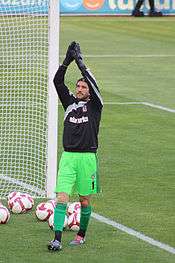
Players in bold are still active, at least at club level.[40] As of June 1, 2018.
| # | Name | Career | Caps | Goals |
|---|---|---|---|---|
| 1 | Rüştü Reçber | 1994–2012 | 120 | 0 |
| 2 | Hakan Şükür | 1992–2007 | 112 | 51 |
| 3 | Bülent Korkmaz | 1990–2005 | 102 | 3 |
| 4 | Arda Turan | 2006– | 100 | 17 |
| 5 | Emre Belözoğlu | 2000– | 95 | 9 |
| 6 | Tugay Kerimoğlu | 1990–2007 | 94 | 2 |
| 7 | Alpay Özalan | 1995–2005 | 90 | 4 |
| 8 | Hamit Altıntop | 2004–2014 | 82 | 7 |
| 9 | Tuncay Şanlı | 2002–2010 | 80 | 22 |
| 10 | Mehmet Topal | 2008– | 77 | 2 |
Top goalscorers
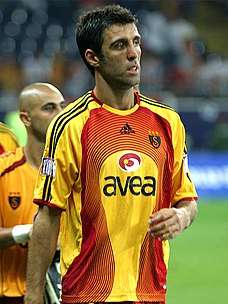
Goalscorers with an equal number of goals are ranked in chronological order of reaching the milestone. Bold indicates still active players.[41] As of October 9, 2017.
| # | Name | Career | Goals | Caps | Rate |
|---|---|---|---|---|---|
| 1 | Hakan Şükür | 1992–2007 | |||
| 2 | Burak Yılmaz | 2006– | |||
| 3 | Tuncay Şanlı | 2003–2010 | |||
| 4 | Lefter Küçükandonyadis | 1948–1963 | |||
| 5 | Metin Oktay | 1956–1968 | |||
| Cemil Turan | 1969–1979 | ||||
| Nihat Kahveci | 2000–2011 | ||||
| 8 | Arda Turan | 2006– | |||
| 9 | Zeki Rıza Sporel | 1923–1932 | |||
| 10 | Ertuğrul Sağlam | 1993–1998 | |||
| Arif Erdem | 1993–2004 | ||||
| Cenk Tosun | 2013– |
Past managers
| Manager | Career Start | Career End | Played | Won | Drawn | Lost | GF | GA | Win % |
|---|---|---|---|---|---|---|---|---|---|
| 26/10/1923 | 26/10/1923 | 1 | 0 | 1 | 0 | 2 | 2 | 00.0 | |
| 25/5/1924 | 12/9/1926 | 12 | 5 | 0 | 7 | 21 | 29 | 41.7 | |
| 17/7/1927 | 17/4/1932 | 8 | 2 | 1 | 5 | 14 | 24 | 25.0 | |
| 22/4/1932 | 4/11/1932 | 2 | 0 | 0 | 2 | 3 | 7 | 00.0 | |
| 12/7/1936 | 1/8/1937 | 3 | 0 | 1 | 2 | 4 | 10 | 00.0 | |
| 23/4/1948 | 30/5/1948 | 2 | 1 | 0 | 1 | 3 | 2 | 50.0 | |
| 2/8/1948 | 5/8/1948 | 2 | 1 | 0 | 1 | 5 | 3 | 50.0 | |
| 28/11/1948 | 20/5/1949 | 5 | 3 | 0 | 2 | 9 | 8 | 60.0 | |
| 20/11/1949 | 20/11/1949 | 1 | 1 | 0 | 0 | 7 | 0 | 100.0 | |
| 28/5/1950 | 28/10/1950 | 2 | 1 | 0 | 1 | 7 | 6 | 50.0 | |
| 3/12/1950 | 10/6/1951 | 2 | 1 | 0 | 1 | 4 | 5 | 50.0 | |
| 17/6/1951 | 21/11/1951 | 3 | 2 | 0 | 1 | 3 | 3 | 66.7 | |
| 1/6/1952 | 8/6/1952 | 2 | 0 | 1 | 1 | 1 | 5 | 00.0 | |
| 8/6/1952 | 23/6/1954 | 9 | 3 | 2 | 4 | 18 | 21 | 33.3 | |
| 17/10/1954 | 17/10/1954 | 1 | 0 | 0 | 1 | 1 | 5 | 00.0 | |
| 3/4/1955 | 26/6/1955 | 2 | 0 | 2 | 0 | 1 | 1 | 00.0 | |
| 18/12/1955 | 01/05/1956 | 5 | 2 | 0 | 3 | 8 | 9 | 16.7 | |
| 01/05/1956 | 25/11/1956 | 2 | 0 | 2 | 0 | 2 | 2 | 00.0 | |
| 5/4/1957 | 8/12/1957 | 4 | 2 | 1 | 1 | 6 | 4 | 50.0 | |
| 4/5/1958 | 10/5/1959 | 7 | 3 | 3 | 1 | 6 | 5 | 42.9 | |
| 8/6/1960 | 8/6/1960 | 1 | 1 | 0 | 0 | 4 | 2 | 100.0 | |
| 27/11/1960 | 16/5/1962 | 10 | 4 | 0 | 6 | 11 | 10 | 40.0 | |
| 10/10/1962 | 10/10/1962 | 1 | 1 | 0 | 0 | 3 | 0 | 100.0 | |
| 25/11/1962 | 16/12/1962 | 4 | 1 | 2 | 1 | 3 | 7 | 25.0 | |
| 27/3/1963 | 9/10/1964 | 4 | 0 | 2 | 2 | 0 | 4 | 00.0 | |
| 27/9/1964 | 20/12/1964 | 3 | 1 | 1 | 1 | 6 | 4 | 33.3 | |
| 24/1/1965 | 9/5/1965 | 4 | 0 | 0 | 4 | 2 | 13 | 00.0 | |
| 21/7/1965 | 25/7/1965 | 2 | 1 | 1 | 0 | 3 | 1 | 50.0 | |
| 9/10/1965 | 30/5/1966 | 5 | 1 | 2 | 2 | 3 | 10 | 20.0 | |
| 12/10/1966 | 17/1/1969 | 17 | 5 | 4 | 8 | 16 | 32 | 29.4 | |
| 30/4/1969 | 16/11/1969 | 6 | 3 | 0 | 3 | 13 | 11 | 50.0 | |
| 17/10/1970 | 14/11/1971 | 6 | 1 | 1 | 4 | 4 | 17 | 16.7 | |
| 5/12/1971 | 5/12/1971 | 1 | 1 | 0 | 0 | 1 | 0 | 100.0 | |
| 12/4/1972 | 31/10/1976 | 29 | 8 | 11 | 10 | 38 | 43 | 27.6 | |
| 17/11/1976 | 17/11/1976 | 1 | 0 | 1 | 0 | 1 | 1 | 00.0 | |
| 16/2/1977 | 5/10/1978 | 13 | 2 | 1 | 10 | 11 | 22 | 15.4 | |
| 29/11/1978 | 15/10/1980 | 12 | 5 | 1 | 6 | 13 | 15 | 41.7 | |
| 3/12/1980 | 25/3/1981 | 2 | 0 | 0 | 2 | 0 | 3 | 00.0 | |
| 15/4/1981 | 7/10/1981 | 4 | 0 | 0 | 4 | 0 | 12 | 00.0 | |
| 22/9/1982 | 4/4/1984 | 17 | 5 | 2 | 10 | 15 | 36 | 29.4 | |
| 6/9/1984 | 14/11/1984 | 5 | 1 | 1 | 3 | 3 | 13 | 20.0 | |
| 22/12/1984 | 3/4/1985 | 3 | 1 | 1 | 1 | 1 | 3 | 33.3 | |
| 1/5/1985 | 28/8/1985 | 2 | 0 | 1 | 1 | 0 | 2 | 00.0 | |
| 11/9/1985 | 12/11/1986 | 8 | 1 | 3 | 4 | 3 | 14 | 12.5 | |
| 4/3/1987 | 16/12/1987 | 6 | 1 | 1 | 4 | 6 | 16 | 16.7 | |
| 16/3/1988 | 15/11/1989 | 11 | 5 | 1 | 5 | 16 | 12 | 45.5 | |
| 11/4/1990 | 11/4/1990 | 1 | 0 | 0 | 1 | 0 | 1 | 00.0 | |
| 27/5/1990 | 28/4/1993 | 27 | 4 | 8 | 15 | 22 | 50 | 14.8 | |
| 27/10/1993 | 19/6/1996 | 33 | 17 | 8 | 8 | 47 | 36 | 51.5 | |
| 14/8/1996 | 24/6/2000 | 31 | 11 | 9 | 11 | 45 | 38 | 35.5 | |
| 16/8/2000 | 18/2/2004 | 50 | 23 | 13 | 14 | 72 | 50 | 46.0 | |
| 31/3/2004 | 31/3/2004 | 1 | 0 | 1 | 0 | 2 | 2 | 00.0 | |
| 28/4/2004 | 8/6/2005 | 15 | 8 | 4 | 3 | 29 | 14 | 53.3 | |
| 17/8/2005 | 14/10/2009 | 58 | 26 | 18 | 14 | 86 | 71 | 39.7 | |
| 3/3/2010 | 29/5/2010 | 4 | 3 | 0 | 1 | 7 | 3 | 75.0 | |
| 1/8/2010 | 15/11/2011 | 16 | 7 | 4 | 5 | 18 | 15 | 43.7 | |
| 17/11/2011 | 20/08/2013 | 18 | 6 | 4 | 8 | 26 | 26 | 33.3 | |
| 22/8/2013 | 26/7/2017 | 44 | 27 | 8 | 9 | 69 | 38 | 62.0 | |
| 2/8/2017 | Current | 6 | 1 | 1 | 4 | 5 | 12 | 16.6 |
Decoration
In 2002, the national team was honored with the Turkish "State Medal of Distinguished Service" for its third place achievement at the 2002 FIFA World Cup. All the team members, coaches and officials were bestowed by a medal.[42]
Gallery
 Arda Turan is one of the longest serving captains of the national team.
Arda Turan is one of the longest serving captains of the national team.- Semih Şentürk is the all-time topscorer of the national team at the UEFA European Championship.
 Nuri Şahin was for a long period the youngest debutant of the national team.
Nuri Şahin was for a long period the youngest debutant of the national team..jpg) Selçuk İnan scored the 700th goal in the history of the national team.
Selçuk İnan scored the 700th goal in the history of the national team.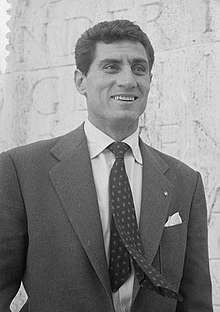 Lefter Küçükandonyadis played in the 1954 FIFA World Cup.
Lefter Küçükandonyadis played in the 1954 FIFA World Cup. Feridun Buğeker played in the 1954 FIFA World Cup.
Feridun Buğeker played in the 1954 FIFA World Cup..jpg) Fatih Terim is the most successful manager in the history of the national team.
Fatih Terim is the most successful manager in the history of the national team.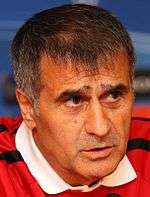 Şenol Güneş managed the national team during the 2002 FIFA World Cup.
Şenol Güneş managed the national team during the 2002 FIFA World Cup.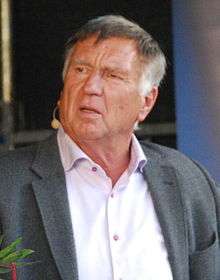 Sepp Piontek managed the national team between 1990 and 1993.
Sepp Piontek managed the national team between 1990 and 1993. Mustafa Denizli managed the national team during Euro 2000.
Mustafa Denizli managed the national team during Euro 2000.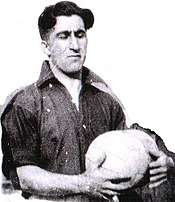 Nihat Bekdik represented Turkey on 21 occasions, captaining them 10 times.
Nihat Bekdik represented Turkey on 21 occasions, captaining them 10 times.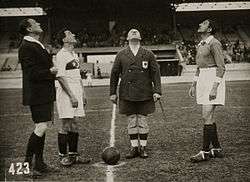 Zeki Rıza Sporel during the coin toss between Turkey and Egypt before the Summer Olympics match on 28 May 1928.
Zeki Rıza Sporel during the coin toss between Turkey and Egypt before the Summer Olympics match on 28 May 1928.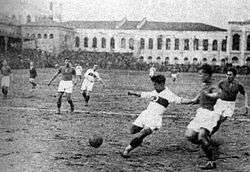 Hakkı Yeten during a match against Hungary on 22 April 1932.
Hakkı Yeten during a match against Hungary on 22 April 1932._and_Cor_van_der_Hart_in_4_May_1958.jpg) Turgay Şeren and Cor van der Hart on 4 May 1958.
Turgay Şeren and Cor van der Hart on 4 May 1958.
Notes
References
- ↑ "Turkey sneak through as best third-placed team". UEFA. 14 October 2015. Retrieved 13 March 2015.
- ↑ Jeffree, Iain (6 August 2015). "FIFA Country Codes". RSSSF. Retrieved 10 January 2016.
- ↑ Since the Republic was not formally declared by the time of the event, the game was played between Romania and TFF. The city also was not consistently known as Istanbul in the English speaking world until 1930
- ↑ "The FIFA/Coca-Cola World Ranking - Associations - Turkey - Men's - FIFA.com". FIFA.com. FIFA. Retrieved 15 September 2016.
- ↑ Erdinç, Sivritepe. "Turkey 2–2 Romania". Turkey international football matches. Retrieved 31 October 2010.
- ↑ "Magical Magyars beating". Retrieved 16 September 2010.
- ↑ "Brazil beat brave Turks". BBC Sport. 3 June 2002. Retrieved 20 August 2009.
- ↑ "Parks strike denies Turkey". BBC Sport. 14 June 2002. Retrieved 20 August 2009.
- ↑ "Turkey reach last 16". BBC Sport. 13 June 2002. Retrieved 20 August 2009.
- ↑ "Turkey end Japan's dream". BBC Sport. 18 June 2002. Retrieved 20 August 2009.
- ↑ "Turkey's golden delight". BBC Sport. 22 June 2002. Retrieved 20 August 2009.
- ↑ "Brazil stride into final". BBC Sport. 26 June 2002. Retrieved 20 August 2009.
- ↑ "Turkey finish in style". BBC Sport. 29 June 2002. Retrieved 20 August 2009.
- ↑ Fastest Goals in WC History
- ↑ "Turkey heroes return home". BBC Sport. 1 July 2002. Retrieved 20 August 2009.
- ↑ "Portugal 2–0 Turkey". BBC Sport. 7 June 2008. Retrieved 20 August 2009.
- ↑ "Switzerland 1–2 Turkey". BBC Sport. 11 June 2008. Retrieved 20 August 2009.
- ↑ "Turkey 3–2 Czech R & Switzerland 2–0 Portugal". BBC Sport. 15 June 2008. Retrieved 20 August 2009.
- ↑ "Turkey edge out Czechs in thriller". FIFA.com. FIFA. 15 June 2008. Retrieved 20 August 2009.
- ↑ "Croatia 1–1 Turkey (1–3 pens)". BBC Sport. 20 June 2008. Retrieved 20 August 2009.
- ↑ "Germany 3–2 Turkey". BBC Sport. 25 June 2008. Retrieved 20 August 2009.
- ↑ "Terim Resignation". Guardian Sport. 7 June 2008. Retrieved 20 August 2009.
- ↑ "Turkey marks 500th match". Hürriyet Daily News. 14 November 2012. Retrieved 15 November 2012.
- ↑ Er, İsmail (15 November 2012). "Türkiye 1–1 Danimarka". Hürriyet Spor (in Turkish). Retrieved 15 November 2012.
- ↑ "Terim leaves Turkey role after brawl". goal.com. Goal. 26 July 2017. Retrieved 31 January 2018.
- ↑ "Croatia and Turkey resume old European rivalry in Paris". AP News. Retrieved 2018-07-02.
- ↑ "Croatia national football team: record v Turkey". www.11v11.com. Retrieved 2018-07-02. horizontal tab character in
|title=at position 18 (help) - ↑ uefa.com (2003-10-06). "UEFA EURO 1996 - History - Turkey-Croatia – UEFA.com". Uefa.com. Retrieved 2018-07-02.
- ↑ uefa.com (2008-06-20). "UEFA EURO 2008 - History - Croatia-Turkey – UEFA.com". Uefa.com. Retrieved 2018-07-02.
- ↑ uefa.com (2011-11-11). "UEFA EURO 2012 - History - Turkey-Croatia – UEFA.com". Uefa.com. Retrieved 2018-07-02.
- ↑ uefa.com (2011-11-15). "UEFA EURO 2012 - History - Croatia-Turkey – UEFA.com". Uefa.com. Retrieved 2018-07-02.
- ↑ "Turkey 0-1 Croatia". BBC Sport. 2016-06-12. Retrieved 2018-07-02.
- ↑ "[VIDEO] Modrić golčinom srušio žestoke Turke!". Hrvatska radiotelevizija. Retrieved 2018-07-02.
- ↑ FIFA.com. "2018 FIFA World Cup Russia™ - Matches - Croatia-Turkey - FIFA.com". FIFA.com. Retrieved 2018-07-02.
- ↑ FIFA.com. "2018 FIFA World Cup Russia™ - Matches - Turkey-Croatia - FIFA.com". FIFA.com. Retrieved 2018-07-02.
- ↑ "[VIDEO] Hrvatska izgubila u Eskisehiru, Turci slavili 1:0". Hrvatska radiotelevizija. Retrieved 2018-07-02.
- ↑ "Turkey national football team: record v Greece". www.11v11.com. Retrieved 2018-07-02. horizontal tab character in
|title=at position 17 (help) - ↑ CNN, By Greg Duke For. "Top 10 international rivalries - CNN.com". edition.cnn.com. Retrieved 2018-07-02.
- ↑ "Football's Greatest Rivalries: Turkey v Armenia". World Soccer. 2016-01-01. Retrieved 2018-07-02.
- ↑ "A Milli Takım En Fazla Milli Olan Oyuncularımız TFF". Retrieved 15 September 2016.
- ↑ "Türkiye Futbol Federasyonu Ana Sayfa TFF". tff.org. Turkish Football Federation. Retrieved 21 June 2017.
- ↑ "Hata Sayfası". Retrieved 29 October 2016.
External links
- Official website (in Turkish) (in English)